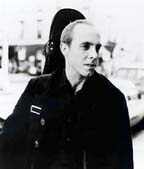Freedy Johnston is arguably one of the most important songwriters of our generation. A master storyteller, he combines simple melodies with well-crafted lyrics to evoke worlds that stretch far beyond the confines of his songs.
A former resident himself, Johnston’s first recording Time For A Change was released on Hoboken’s own Bar None Records in 1989. Bar None reps said they had to go all the way to “remote, mysterious Kansas” to find him, but they said it was worth the trip. They brought Johnston back to Hoboken, and his career has been soaring since. And on Friday, Nov. 3, he’ll be playing at Maxwell’s at 11 p.m. for the Fourth Annual Independent Music Festival.
Even though he’s always been more of a musical loner, Johnston put a band together in 1990 and released The Trouble Tree, which was well-received in Holland and Belgium. In 1992, when he released the Can You Fly LP (co-produced by legendary bassist Graham Maby), he made it to many of the year-end top 10 lists, including Spin, People and The New York Times, and he started touring with Soul Asylum, The Lemonheads and Matthew Sweet.
In 1994, Elektra put outThis Perfect World, and it put Johnston over the top. It was produced by Butch Vig (Nirvana, Smashing Pumpkins) and debuted a more crafted sound for Johnston. The lush production and soaring melodies were an ironic setting for his melancholy, often despairing lyrics. But his hit single “Bad Reputation” scored with fans and critics alike, and Rolling Stone named him their songwriter of the year and crowned him “An American Original.”
Despite his rapid success, Johnston always showed tremendous focus and modesty in his songwriting right from the start.
“I got my first guitar when I was 16, but I was a very slow learner,” said Johnston. “By the time I got to New York, I figured I could play well enough to at least accompany my own songs.”
And Johnston said he’s always admired the work-a-day writers and musicians who have paid their dues.
“I meet a lot of musicians on the road, realizing this is my ‘club,’ the community I’m in, but I started out working totally alone,” said Johnston. “The four track machine was how I got my start. I hadn’t yet learned how to work and jam with other musicians. All the songs went from my head to the four track. Slowly, through live playing and recording, I fell into a groove of working and playing and being comfortable with other musicians. Now I realize that a great part of the process is working with a great cast of people.”
Even after a decade of writing songs, Johnston is still somewhat reluctant to talk about his own work. What he does admit, is that he enjoys the revelations of other songwriters.
“I like it when songwriters reveal the background of a particular song,” said Johnston. “It helps me understand all of their songs better. It’s not necessary, just an added insight. Tom Waits or Elvis Costello can create a world with a little melody and a one lyric line. You shouldn’t have to add much if you’ve done your work.”
Johnston also cites Tom Petty and Paul Westerberg as other singer/songwriters who have influenced his work.
“I’m continually surprised by the power of music,” said Johnston. “Songs can help you through a tough time, and they can accentuate a good time. People I don’t even know come up to me and say ‘Thanks for that song.’ Fans take your songs and paste them to their own lives. I can’t imagine a more gratifying thing than that.” – L.T.
